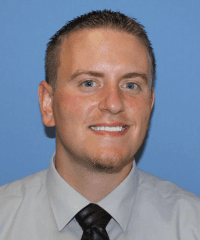
Dr. Zachary Hansen is currently a second-year family medicine resident at the Washington
Health System. He was born and raised in the beautiful state of Utah. After high school, he lived
in Belgium in the Netherlands for 2 years, where he became fluent in Dutch. He attended the
University of Utah studying exercise and sports science. Afterwards, he enrolled in A.T. Still
University Kirksville College of Osteopathic Medicine in Kirksville, Missouri. When he is not
working, Zachary enjoys spending time with his wife and two girls by having frequent dance
parties and the occasional fight night. His fight name is “The Backbreaker”.
Lung Cancer Awareness
With November being lung cancer awareness month, it is a good reminder for us to understand
the impact lung cancer may cause. It is also important to remember what we can do to identify
and prevent lung cancer.
Lung cancer is the most common cause of cancer death in United States and worldwide. In fact,
lung cancer is responsible for more deaths in this country than the next three most common
causes of cancer deaths combined: colorectal cancer, breast cancer, and pancreatic cancer.
Lung cancer happens when cells in the lungs change (were mutated). Most often, this is
because of exposure to dangerous chemicals that we breathe. But lung cancer can also happen in
people with no exposure to toxic substances. Unlike normal cells, cancer cells grow
uncontrollably and cluster together to form a tumor, destroying the healthy lung tissue around
them. Symptoms usually do not appear until cancer cells spread to other parts of the body and
prevent other organs from functioning properly. At this point, it is harder to treat lung cancer.
Many people with lung cancer do not have symptoms until the disease is in its later stages. When
symptoms are present, they are different in each person. Symptoms may include a cough that
does not go away and gets worse over time, hoarseness, constant chest pain, shortness of breath
or wheezing, frequent lung infections, and coughing up blood. Other symptoms of lung cancer
that may not seem related to the lungs or breathing include unplanned weight loss, loss of
appetite, headaches, bone pain or fractures, and blood clots.
Smoking is the most common cause of lung cancer. Other risk factors of lung cancer include
being exposed to secondhand smoke, family history of lung cancer, being treated with radiation
therapy to the breast or chest, exposure to up specialists, chromium, nickel, arsenic, sit, or tar in
the workplace, and exposure to radon.
If you currently, or have experienced any of these risk factors in the past, it is a good idea to
speak with your doctor to determine what treatments or preventative measures are right for you.
Your family doctor can help you answer any questions or concerns you may have about lung
cancer, as well as ways to prevent and limit your risks.
Washington Health System has an integrated interdisciplinary with UPMC to help with
prevention as well as treatment of lung cancer. A healthy lifestyle and advice from your family
physician can help you be as healthy as you can be and learn what to look for to help you or a
loved one get the care they deserve.


